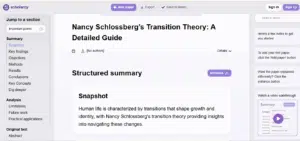Reading long articles, essays, or research papers can take hours or slow down your working speed. But some of the best text summarisers, as listed, can help you quickly shorten the large pieces of text while keeping the context or meaning intact.
- Research Prospect
- QuillBot
- Scholarcy
- Jasper AI
- SMMRY
How Do AI Summarisers Work to Give Summaries?
All AI-based text summarisers use Natural Language Processing (NLP) and machine learning to read, understand, and shorten text. They identify key phrases, main topics, and sentence patterns to generate a summary.
Most tools often fall short in maintaining the context and produce fluff responses, but the best text summarisers available online provide only the critical information from the given content.
There are two best ways to summarise text, and efficient tools use only them to offer reliable results:
- Extractive Summarisation: The tool picks the most important sentences or phrases from the given text and combines them. It doesn’t rewrite content from scratch; instead, it just extracts the most relevant parts for the synopsis.
- Abstractive Summarisation: This type is used by AI models to rewrite the main ideas in simple sentences. That’s why the tool’s response is closer to how a human summarises a passage.
Some advanced text shorteners, like that of ResearchProspect, combine both methods to deliver summaries that sound natural while staying true to the original meaning.
Factors We Have Considered for Ranking These Tools
To find the best text summarisers online, we have tested nearly 10 popular platforms based on the following factors.
- Accuracy: The tool should preserve the original meaning, tone, and facts while removing fluff, in order to keep the key ideas or original context intact even after simplifying the content.
- Ease of Use: We checked how easy it is to upload, paste, or edit text and how clean the interface feels. If the platform is interactive and easy to use, then we have picked it.
- Speed: Summaries should be generated within seconds without quality loss. That’s where most tools we have considered got out of the race, and only highly efficient ones remained in the competition.
- Features: We compared whether each tool supports paraphrasing, document uploads, citations, or custom summary lengths. The more features a tool has, the more lucrative the option is for writing a summative essay based on tons of studies.
- Pricing: Many tools have free versions, but we also reviewed how fair and flexible the paid plans are, so that if a student wants to switch to the paid version, they won’t regret it.
- Language Support: Some tools work only in English, while others can summarise in multiple languages. It is not necessary that students always have to paraphrase or recap text in only one language.
- User Feedback & Reliability: We considered online reviews, ratings, and user trust because no one can better explain the ins and outs of any tool other than the real-time user.
These factors have helped us choose tools that don’t just shorten text but actually help users understand the ideas better and work smarter. Whether you’re summarising essays, reports, or blogs, these tools can make your work faster.
Looking for dissertation help?
Research Prospect to the rescue then!
We have expert writers on our team who are skilled at helping students with dissertations across a
variety of disciplines. Guaranteeing 100% satisfaction!
Comparison Table: Best AI Summarising Tools 2025
| Tool | Best For | Type | Free Plan | Accuracy | Distinctive Feature | Overall Rating |
|---|---|---|---|---|---|---|
| Research Prospect | Academic and research writing | Abstractive | 9.7/10 | Deep academic understanding | ⭐ 4.9 | |
| QuillBot | Academic and social media content | Hybrid | 9.3/10 | Multi-mode summarising | ⭐ 4.8 | |
| Scholarcy | Research papers and journals | Extractive | 9.1/10 | Auto-citations and flashcards | ⭐ 4.7 | |
| Jasper AI | Business and creative writing | Abstractive | 8.9/10 | AI copywriter with summariser | ⭐ 4.6 | |
| SMMRY | Bloggers and working professionals | Extractive | 8.5/10 | Simple and free interface | ⭐ 4.4 |
1. ResearchProspect Text Summariser
Overview
The ResearchProspect Text Summariser stands out as one of the most accurate and intelligent tools for academic writing. Since it is specifically designed for students, researchers, and professionals, its smart algorithms understand the complexity of academic texts better than most AI text summarisation tools.
This summariser produces accurate results because it uses advanced Natural Language Processing (NLP) and AI-based algorithms to identify central arguments, theories, and supporting evidence. In our tests, it has produced summaries that are not only concise but also logical, readable, and ready for academic use.
It has two output modes:
Paragraph for abstractive summaries.
Bullet Points for extractive summaries.
One of its biggest strengths is its ability to retain the original academic structure that most AI-based text summarisers fail to do. Whether you’re composing a literature review of a dissertation or a research paper, it provides a well-balanced version that maintains context integrity and avoids distortion.
You can choose the summary length or summarisation model, such as business or academic, to get the tailored response. Moreover, its minimal design and direct summarisation process make it perfect for anyone who needs clarity without falling into complexity.
Features
- Smart AI trained on academic and research texts
- Generates abstracts, summaries, or overviews
- Works on all types of text pieces
- Clean and simple user interface
Pros
Ideal for research and scholarly work
High accuracy for academic terms and tone
Easy to use without interruptions from advertisements
Free to use, no login required
Cons
Less suitable for casual articles or blogs
Requires internet connection
Pricing
It is completely free to use, but has a limit of up to 4,000 characters per session. The good news is you can run unlimited sessions without paying a penny.
Best For
Students, professors, and researchers who want a precise or ready-to-use synopsis without risking the loss of key ideas.
2. QuillBot
Overview
QuillBot is the best AI tool for summarising text as it offers multiple functions, including summarising, paraphrasing, and grammar checking. Its summariser feature stands out for being quick, flexible, and reliable.
It has two modes:
- Key Sentences Mode for extractive summaries.
- Paragraph Mode for abstractive summaries.
Users can adjust the summary length, highlight keywords, and instantly rewrite text to make it sound more natural. QuillBot can also be integrated with Chrome and Microsoft Word using the extension or the app, which makes it easy to use directly while writing.
QuillBot offers balanced output, making it ideal for academics and business. You can use it to shorten research articles, simplify essays, or write concise business reports to keep the work going.
In our rigorous testing, its accuracy and user control proved excellent even with different types of documents.
Features
- Two summarising modes
- Adjustable summary length
- Paraphraser, grammar, and tone settings
- Chrome and Word extensions
Pros
User-friendly and quick
Works on both short and long texts
Customisable length and tone
Has a free plan
Cons
Word limit for free version
May miss subtle context in complex research
Pricing
Free plan available. Premium starts at $4.17/month.
Best For
Writers, students, and professionals who need quick and reliable summaries with a touch of paraphrasing.
3. Scholarcy
Overview
Scholarcy is built especially for academics and researchers. It can read entire research papers, extract main findings, and generate short summaries that include references and citations. Precisely, a researcher can do everything when working on their dissertation ideas.
When you upload a PDF or Word file, it highlights important sections such as background, methodology, and conclusion so that you can get the synopsis or even offer “flashcards” for each session to help you use key concepts in the literature review.
Scholarcy uses an extractive summarisation approach, meaning it finds and presents key sentences rather than rewriting them. That makes it extremely reliable for maintaining factual accuracy in academic documents because some AI-based tools distort facts when reproducing the text.
It can be integrated with reference managers like Zotero and Mendeley to manage multiple research studies on one platform. Scholarcy lacks creativity, but its academic focus and reference recognition capabilities make it a time saver for researchers.
Features
- It can facilitate the upload of PDFs, DOCX, or URLs
- Detects and extracts references
- Creates automatic flashcards
- Works with Zotero and Mendeley
Pros
Excellent for long academic or technical papers
Creates study summaries and highlights
Helps with citation management by supporting tools.
Cons
Not ideal for creative or casual writing
Free plan has limited document uploads
Pricing
A free version is available, but you can upgrade to a premium plan for unlimited summaries by paying $4.99/month.
Best For
Academics and researchers who need structured, citation-rich summaries to add to papers.
4. Jasper AI
Overview
Jasper AI (formerly Jarvis) is not just a summariser; it’s a full-fledged writing assistant that can help with everything from writing words to summarising them for writing research papers. It’s specifically designed for businesses, marketers, copywriters, and content creators who want to summarise and write in one place.
Jasper’s summariser can shorten blog posts, reports, and marketing content while keeping tone and voice consistent. Unlike other tools, it uses contextual understanding to generate readable and perfectly reflective content summaries that match your writing style.
Its user interface is clean, intuitive, and built for professionals who need efficiency without getting stuck in finding buttons. Students or even working professionals can use it to save their time by getting an on-point synopsis.
Features
- AI summariser plus 50+ writing templates available to turn the overview into a blog or essay.
- Supports 25+ languages
- Custom tone options are available to generate personalised solutions.
- Compatible with team collaboration tools
Pros
Perfect for marketing and business content
Great interface with many AI features
Consistent quality and tone
Cons
High price if used only for summarising
Not suitable for research or academic use
Pricing
Plans start from $59/month (no free plan available, but you can enjoy a free trial).
Best For
Marketing teams, agencies, and creators who want summarisation plus AI content generation at one platform.
5. SMMRY
Overview
It is specifically a browser-based platform that can shorten text instantly as It is quick and easy to use. There’s no need to log in or first pay, as it allows users to paste any text, upload a file, or even input a web URL to summarise it.
You can choose how many sentences you want in the final output and enjoy navigating through every feature because of its clean and intuitive user interface.
It works on a basic extractive summarisation method, and it is best for articles, news summaries, or personal notes rather than research. SMMRY is the best choice for users who want quick and basic responses.
Features
- Free browser-based tool
- Adjustable summary length
- Supports web links, files, or pasted text
- Offers Instant one-click results
Pros
Completely free
Very quick and lightweight
No sign-up or installation
Cons
Limited accuracy for academic or long content
Doesn’t paraphrase or analyse meaning
Pricing
It is completely free to use.
Best For
Anyone who wants a free, fast, and reliable summary of short online content.
How can you choose the Best Text Summariser?
To choose the best AI text summariser, you need to identify your goals, the text type to treat, and the accuracy level you can’t go below.
If you are an academic researcher, go for ResearchProspect or Scholarcy. Both tools understand complex structure and preserve meaning while summarising, which is vital for scientific or university-level writing.
For students or professionals who need everyday summarising with flexibility, QuillBot is ideal. Due to its dual modes and free plan, it is a great choice. If your focus is on content creation, marketing, or social media, Jasper AI is ideal for you. It combines summarisation with content generation that saves time for writers and teams.
For quick and free solutions, consider SMMRY to get the job done without signup or subscription charges.
Conclusion
Picking the best AI text summariser is not very difficult because all you need to do is try and test each platform. Once the results are out, you can choose one from the tested platforms to move further. However, if you don’t have the time to do experiments, rely on our analysis and go with the most efficient one for you.
Remember, the best one is the only one like ResearchProspect that can allow you to turn complex text into short or punchy information without disturbing the context or meaning.
Frequently Asked Questions
You can upload or paste the text into a reliable text summariser like ResearchProspect and then select the summary length or summarisation model. After that, let the tool summarise it and reproduce the synopsis of the given text.
So far, according to our research, tools like ResearchProspect, QuillBot, or Scholarcy are the best ones for academic researchers. All of these three tools are capable of extracting the key ideas necessary for referencing or building arguments.
Yes, ChatGPT can summarise any article given to it by identifying key themes, arguments, and conclusions. You can specify the summary length or tone according to your preference, and it can handle both short-form content and detailed research studies nicely without disturbing the context.











